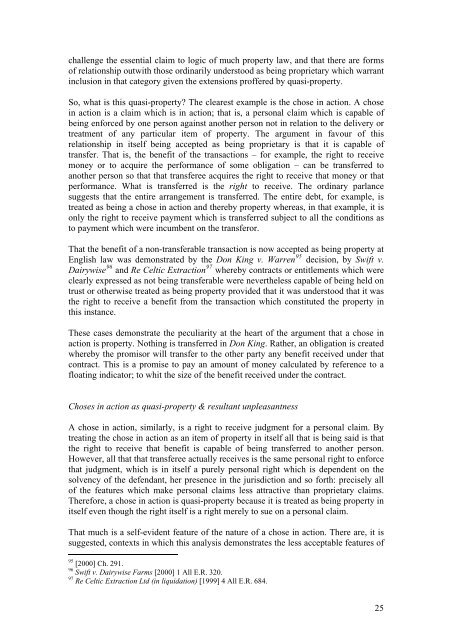The Unbearable Lightness of Property - alastairhudson.com
The Unbearable Lightness of Property - alastairhudson.com
The Unbearable Lightness of Property - alastairhudson.com
Create successful ePaper yourself
Turn your PDF publications into a flip-book with our unique Google optimized e-Paper software.
challenge the essential claim to logic <strong>of</strong> much property law, and that there are forms<br />
<strong>of</strong> relationship outwith those ordinarily understood as being proprietary which warrant<br />
inclusion in that category given the extensions pr<strong>of</strong>fered by quasi-property.<br />
So, what is this quasi-property <strong>The</strong> clearest example is the chose in action. A chose<br />
in action is a claim which is in action; that is, a personal claim which is capable <strong>of</strong><br />
being enforced by one person against another person not in relation to the delivery or<br />
treatment <strong>of</strong> any particular item <strong>of</strong> property. <strong>The</strong> argument in favour <strong>of</strong> this<br />
relationship in itself being accepted as being proprietary is that it is capable <strong>of</strong><br />
transfer. That is, the benefit <strong>of</strong> the transactions – for example, the right to receive<br />
money or to acquire the performance <strong>of</strong> some obligation – can be transferred to<br />
another person so that that transferee acquires the right to receive that money or that<br />
performance. What is transferred is the right to receive. <strong>The</strong> ordinary parlance<br />
suggests that the entire arrangement is transferred. <strong>The</strong> entire debt, for example, is<br />
treated as being a chose in action and thereby property whereas, in that example, it is<br />
only the right to receive payment which is transferred subject to all the conditions as<br />
to payment which were incumbent on the transferor.<br />
That the benefit <strong>of</strong> a non-transferable transaction is now accepted as being property at<br />
English law was demonstrated by the Don King v. Warren 95 decision, by Swift v.<br />
Dairywise 96 and Re Celtic Extraction 97 whereby contracts or entitlements which were<br />
clearly expressed as not being transferable were nevertheless capable <strong>of</strong> being held on<br />
trust or otherwise treated as being property provided that it was understood that it was<br />
the right to receive a benefit from the transaction which constituted the property in<br />
this instance.<br />
<strong>The</strong>se cases demonstrate the peculiarity at the heart <strong>of</strong> the argument that a chose in<br />
action is property. Nothing is transferred in Don King. Rather, an obligation is created<br />
whereby the promisor will transfer to the other party any benefit received under that<br />
contract. This is a promise to pay an amount <strong>of</strong> money calculated by reference to a<br />
floating indicator; to whit the size <strong>of</strong> the benefit received under the contract.<br />
Choses in action as quasi-property & resultant unpleasantness<br />
A chose in action, similarly, is a right to receive judgment for a personal claim. By<br />
treating the chose in action as an item <strong>of</strong> property in itself all that is being said is that<br />
the right to receive that benefit is capable <strong>of</strong> being transferred to another person.<br />
However, all that that transferee actually receives is the same personal right to enforce<br />
that judgment, which is in itself a purely personal right which is dependent on the<br />
solvency <strong>of</strong> the defendant, her presence in the jurisdiction and so forth: precisely all<br />
<strong>of</strong> the features which make personal claims less attractive than proprietary claims.<br />
<strong>The</strong>refore, a chose in action is quasi-property because it is treated as being property in<br />
itself even though the right itself is a right merely to sue on a personal claim.<br />
That much is a self-evident feature <strong>of</strong> the nature <strong>of</strong> a chose in action. <strong>The</strong>re are, it is<br />
suggested, contexts in which this analysis demonstrates the less acceptable features <strong>of</strong><br />
95 [2000] Ch. 291.<br />
96 Swift v. Dairywise Farms [2000] 1 All E.R. 320.<br />
97 Re Celtic Extraction Ltd (in liquidation) [1999] 4 All E.R. 684.<br />
25













